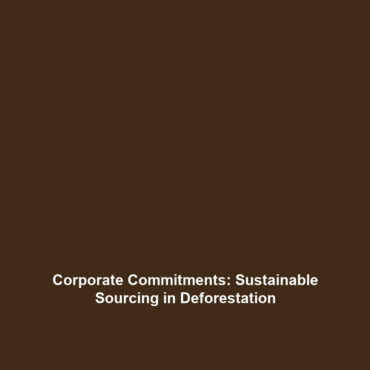Corporate Commitments to Sustainable Sourcing: A Pathway to Combat Deforestation and Biodiversity Loss
Introduction
In recent years, corporate commitments to sustainable sourcing of commodities like palm oil, soy, and beef have gained unprecedented attention. These commitments are essential in the fight against deforestation and biodiversity loss, two major global challenges. As the world grapples with climate change and environmental degradation, sustainable sourcing practices not only help preserve ecosystems but also promote ethical consumption. This article delves into the significance of these corporate commitments and their roles in shaping a sustainable future.
Key Concepts
Understanding Sustainable Sourcing
Sustainable sourcing refers to the procurement of raw materials that meet social, environmental, and economic standards. Key principles include:
- Transparency: Companies must disclose their sourcing policies and practices.
- Traceability: The ability to track the origin of commodities to ensure they were sourced sustainably.
- Certification: Many corporations seek certification from recognized organizations to validate their sustainable practices.
Impact on Deforestation and Biodiversity
The sustainable sourcing of commodities like palm oil, soy, and beef directly impacts deforestation rates and biodiversity. Unsustainable practices have led to significant habitat destruction, threatening countless species and ecosystems.
Applications and Real-World Uses
How Corporate Commitments are Implemented
Corporations are increasingly recognizing how their commitments to sustainable sourcing can benefit Deforestation and Biodiversity Loss issues. Some notable applications include:
- Certification Schemes: Many companies participate in organizations like the Roundtable on Sustainable Palm Oil (RSPO) to ensure responsible production.
- Supply Chain Audits: Implementing rigorous checks across supply chains to prevent deforestation-linked commodities.
- Alternative Practices: Investing in agroforestry and other sustainable farming techniques to reduce pressure on natural habitats.
Current Challenges
Challenges of Sustainable Sourcing
Despite the growing commitment to sustainable sourcing, several challenges persist, including:
- Inconsistent regulations across regions complicate enforcement.
- Lack of consumer awareness diminishes demand for sustainably sourced products.
- Limited availability of sustainably produced options affects implementation.
Addressing these issues is crucial for corporate effectiveness in combating deforestation and biodiversity loss.
Future Research and Innovations
Next-Generation Solutions
Innovative research is paving the way for more effective sustainable sourcing. Future efforts may include:
- Blockchain Technology: Enhanced transparency and traceability in supply chains.
- Genetic Engineering: Developing more sustainable crop varieties that require less land and produce higher yields.
- Sustainable Alternatives: The exploration of plant-based alternatives to reduce reliance on deforestation-linked commodities.
Conclusion
Corporate commitments to sustainable sourcing of commodities like palm oil, soy, and beef play a vital role in addressing the urgent issues of deforestation and biodiversity loss. By prioritizing sustainability, businesses can not only contribute to environmental conservation but also enhance their market value and consumer trust. To learn more about sustainable practices and their impact on biodiversity, explore our related articles on eco-friendly business models and environmental initiatives.
For further insights on sustainability in corporate practices, visit our Sustainability Initiatives page.
